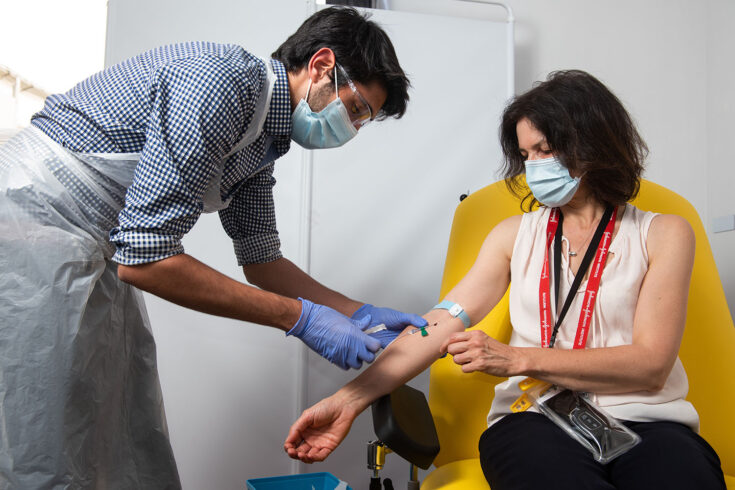The Lancet has published the world’s first peer-reviewed results of the University of Oxford and AstraZeneca phase 3 COVID-19 vaccine trials.
The vaccine has been supported by UK Research and Innovation’s Medical Research Council (MRC) and the published data confirms the vaccine is safe, effective and gives good protection.
University of Oxford and AstraZeneca researchers presented a pooled analysis of phase 3 trials of a vaccine against SARS-CoV-2 across two different dose regimens, resulting in an average efficacy of 70.4%.
These results confirm the interim results announced on 24 November 2020. The pooled analysis in the study shows that:
- the overall vaccine efficacy at least 14 days after the second dose was 70.4%
- the standard dose or standard dose sub-groups showing 62.1% efficacy
- the low dose or standard dose sub-group demonstrating 90.0% efficacy.
No hospitalisations or severe disease were observed in the vaccinated groups.
Safe and effective
The authors further report on an extensive safety database from volunteers in the UK, Brazil and South Africa accompanying the efficacy findings.
Of 23,848 trial volunteers, and over 74,000 ‘person-months’ of safety follow up, only three from 175 reported serious adverse events were possibly related to the vaccine.
Of these, one was considered ‘possibly related’ to the ChAdOx1 nCoV-19 vaccine, one occurred in the control group, and a further case of severe fever in the vaccinated group was considered to be an expected vaccine-related event.
The data also indicate that the vaccine can reduce the spread of COVID-19, as well as protect against illness and death.
A landmark for the vaccine
Professor Fiona Watt, Executive Chair of MRC said:
This publication is another landmark for the vaccine. It gives us all reassurance that the vaccine is safe and effective. There were no cases of severe disease in those vaccinated.
We’re another step closer to the vaccine becoming approved.
One of the most exciting components of the Oxford vaccine is that it can be rolled out using existing infrastructure and doesn’t need to be stored at -70oC.
The new vaccine builds on decades of MRC funded research and investment. We’re indebted to the people that have made this possible – not only the lead researchers but also the study volunteers, postdocs, technicians and administrators.
Professor Sarah Gilbert, Professor of Vaccinology at the University of Oxford, said:
We have known for many years that adenoviral vectored vaccines fulfil the requirements for use against outbreak or pandemic diseases. They are safe, highly immunogenic, can be manufactured in large quantities at low cost and do not require frozen storage.
Following the demonstration of vaccine efficacy in many preclinical studies, we now have clear evidence of efficacy in the trial results presented in a peer-reviewed publication today. Now under regulatory review, we hope that this vaccine will shortly be in use to start saving lives.
Top image: Oxford Vaccine Group Clinic, participant bloods (credit: University of Oxford, John Cairns)

